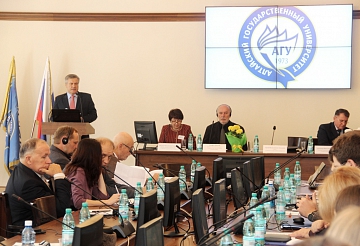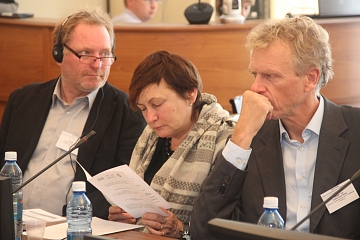The Kulunda project is over: scientists of ASU and Germany are summing up the results
 The event, which was the final point of the Kulunda project, was attended by leading scientists of the Altai State University, Martin Luther Halle-Wittenberg University and Leibniz Institute of Agricultural Development of Central and Eastern Europe (Halle, Germany), Leibniz Institute of Regional Geography, Society (Leipzig) and Altai State Agricultural University.
The event, which was the final point of the Kulunda project, was attended by leading scientists of the Altai State University, Martin Luther Halle-Wittenberg University and Leibniz Institute of Agricultural Development of Central and Eastern Europe (Halle, Germany), Leibniz Institute of Regional Geography, Society (Leipzig) and Altai State Agricultural University.
“Altai State University has always attached and attaches great importance to the Kulunda project - a multifaceted, interdisciplinary unit, which has been successfully implemented in various scientific, educational and social areas,” remarked Sergey Valentinovich Zemlyukov, rector of ASU. "It is very important for us that over the course of five years we have developed and strengthened the partnership with educational institutions, research institutes of Russia and Germany. It is cooperation that allows us to achieve significant results in the implementation of the project, and this, in my opinion, is an important achievement. Another important moment of the Kulunda project
is the interaction with agricultural enterprises during the project implementation and their belief in the effectiveness of this project. I note that during the implementation of Kulunda we acquired a new organizational, research experience of joint work, which, I hope, will help solve the pressing issues of the regional economy.”
On behalf of the Governor of Altai Krai, Alexander Bogdanovich Karlin, the seminar participants were greeted by the Head of Altai Krai General Directorate of Agriculture, Alexander Nikolaevich Chebotaev, noting that the Kulunda project is a significant contribution not only to the development of applied scientific research, but also to the process of international integration of various levels and organizational forms of education, science and practice.
“It is difficult to overestimate the practical and scientific significance of the Kulunda project for Altai Krai, which has the largest arable land in Russia, has seven soil-climatic zones and more than 1 million people living in rural areas. Recommendations developed in the framework of the project, on the cultivation of crops using new generation equipment, perfect agricultural practices on soil cultivation, methods of fertilizer application and plant protection systems of the steppe and forest-steppe zones of the region, are undoubtedly important for the agricultural sector of the region. We all understand that further development of the agro-industrial complex is impossible without an innovative economy based on a high level of science and education,” said Alexander Nikolaevich Chebotaev.
The curator of the project, the dean of the Faculty of  Biology of ASU, Doctor of Biology, professor Marina Mikhaylovna Silantyeva told that in five years there have been many authoritative scientific works on Kulunda published in the world, which essentially made this project a scientific brand, thanks to which Altai Krai has become famous.
Biology of ASU, Doctor of Biology, professor Marina Mikhaylovna Silantyeva told that in five years there have been many authoritative scientific works on Kulunda published in the world, which essentially made this project a scientific brand, thanks to which Altai Krai has become famous.
The final project of a scientific and practical seminar for three days will present the results of various areas of work on Kulunda. The point in this event will be put by the report of Professor Manfred Fruauf entitled “Kulunda and what's next?”.